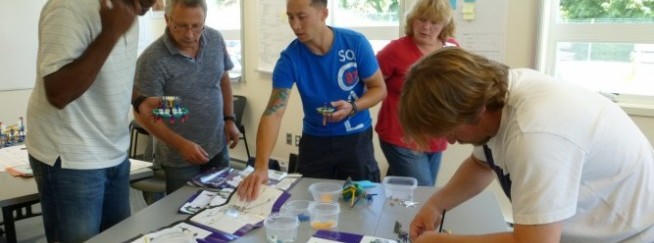Centred on productivity: why IMTARC is primed to fill the construction training gap
Published by: Journal of Commerce
Date: Aug 11, 2016
Nobody is going to confuse a navy destroyer for a Vancouver condominium, but there’s a remarkable overlap in the skills required to build them. It’s just one reason that Alex Rueben, executive director of the Industrial Marine Training & Applied Research Centre (IMTARC) wants BC construction companies to give his organization a first look to both train construction workers and to develop course material on their behalf.
IMTARC was launched in early 2013 as a not-for-profit initiative, with initial funding provided by the federal and provincial governments and the industrial marine sector to prepare workers to meet the needs of Canada's National Shipbuilding Strategy. The centre doesn't compete with post-secondary vocational institutions in skilled trades training, but instead fills training gaps identified by industry.
Located in Esquimalt on Vancouver Island, IMTARC offers a 4,000-square foot, state-of-the-art training facility offering classrooms and computer lab plus wired, wireless and traditional tools to suit student audiences from age 18 to 65.
"There's absolutely no difference between the skills training required across construction, marine and industrial settings for course curriculum such as welding, working with CNC machinery, WHMIS, confined space entry, planning and scheduling, electrical safety and fall protection awareness," says Rueben.
But there's also a second category of courses for which the centre has seen a strong demand, targeting mid-level management in both construction and heavy industry.
"With the older generation retiring, we're seeing a lot of younger lead hands thrust into leadership positions without formal leadership training," says Rueben. "Available leadership training tends to focus on an office environment, but there's a big difference between the leadership skills required there and on a high-rise job site or in the back of a machine shop. These programs include such skills as interpersonal communications, conflict resolution, coaching and mentoring, entry level supervision and also training for senior personnel seeking excellence in leadership."
A third category includes project management courses, involving anything from project management fundamentals to Project Management Professional certification and Certified Associate in Project Management examinations overseen by the Project Management Institute. As a non-profit, IMTARC aims to run a lean ship in order to keep course prices at a minimum. It maintains a small permanent staff and has developed an extensive network of contracted trainers, including retired industry professionals, to provide instruction as needed.
"We don't limit ourselves to local trainers," says Rueben. "We'll cast a net across the entire country to find the best people to deliver the required program and bring them here."
The centre has also demonstrated a capacity for cost-effective development of made-to-order courses and programs.
"If we're approached to create a specific construction program, we'll first determine the required outcomes of the training and which competencies are required to achieve that outcome," says Rueben. "Next, we'll make sure that there is no course available that could already meet that client's training needs. If we need to build a program, we canvas other groups to see if there's wider market demand for that program. Why just limit it to construction if we can take advantage of the economies of scale and share course development costs with companies in the manufacturing or industrial marine sectors? That directly lowers the per head cost of the program for attending students."
IMTARC then builds the new training program by issuing an RFP to accredited course developers and then works with those developers to deliver targeted educational content. The centre has already developed programs from the ground up in response to industry demand for courses in estimating and leadership skills, for example.
"Since we opened the centre, we've seen 15,000 people completing more than 700 training courses," says Rueben. "With only 3,400 people employed in shipbuilding and ship repair in the entire province, the construction and industrial sectors have clearly been benefiting from what we offer. Our goal is to enhance productivity in whatever sector we're serving."



Site design by Ravensfoot